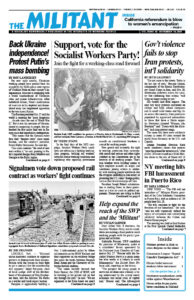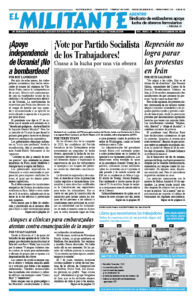Russian President Vladimir Putin’s brutal invasion of Ukraine, meant to expand Moscow’s territory and “sphere of influence,” has had the opposite effect across the old Russian empire. In Central Asia and the South Caucasus, the Kremlin’s political authority is shrinking. This is part of global shifts occasioned by the war that are affecting the capitalist “world order.”
The former Soviet Socialist Republics of Kyrgyzstan, Kazakhstan, Tajikistan, Turkmenistan and Uzbekistan, in a region bounded by Russia, China, Afghanistan and the Caspian Sea, gained independence in 1991 with the implosion of the USSR. Now, with Moscow increasingly bogged down by its war in Ukraine, the capitalist rulers in these countries are taking even more distance. None have supported Putin’s “annexations” in Ukraine.
Beijing and Ankara, as well as Washington, hope to gain from the political space opening up in this vast resource-rich region.
“We want to be respected,” not treated like part of the former Soviet Union, Tajikistan President Emomali Rahmon told Putin at a summit of 27 Asian countries, including China, India and Russia, in Astana, Kazakhstan, Oct. 14.
The day before at the meeting, Turkish President Recep Tayyip Erdogan urged support for the “sovereignty and territorial integrity” of Kazakhstan and its neighbors.
During a visit to the country a month earlier, Chinese President Xi Jinping said Beijing was opposed to interference by external forces in the internal affairs of Central Asian countries. The Chinese rulers are expanding investments in Central Asia. Today China’s economy is 10 times bigger than that of Russia, and Beijing is now the main trading partner of these countries.
Xi has also taken some distance from Putin’s assault on Ukraine’s sovereignty. During the summit Beijing penned a pact with Kyrgyzstan and Uzbekistan for a proposed new rail line to carry Chinese exports to Europe, bypassing sanctions-hit rail links through Russia. This shorter route would break Moscow’s stranglehold on land transport across Eurasia.
At the same time that the Central Asian rulers are embracing Beijing’s trade, investment and security guarantees, they also face countervailing pressures. The mainly Muslim toilers in these countries identify with the Uighurs, who face brutal repression at the hands of Beijing’s rulers in the adjacent Xinjian region.
In January, Moscow rushed 2,000 mainly Russian troops to Kazakhstan to prop up the government against a wave of protest. Two years earlier Russian troops had been dispatched to the Caucasus to enforce a Moscow-mediated truce between Armenia and Azerbaijan.
But the Ukraine war has changed these relations. In September the Kremlin failed to intervene in a Kyrgyzstan-Tajikistan border war. It also didn’t act on the Armenian government’s call for help to halt renewed attacks by Azerbaijani forces backed by the Turkish government.
The Kazakh government, like the other Central Asia regimes, has taken its distance from Putin’s war in Ukraine. Parts of northern Kazakhstan are inhabited by ethnic Russians, and their numbers have swelled by Russians fleeing Putin’s new draft. Nationalist forces there call for these areas to be returned to Russia, the same pretext Putin used to invade Ukraine.

